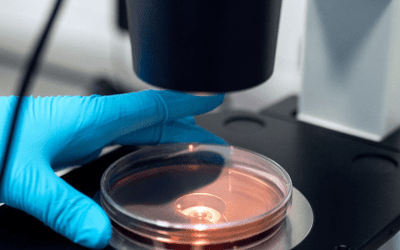Through 2025, the landscape of laboratory practices and technologies is continuing to evolve rapidly. Driven by the need for greater efficiency, accuracy, and sustainability, innovations in lab technologies, processes and practices are reshaping the way scientists conduct research, develop new products, and ensure quality control.
Trends that’ll shape the future of laboratories over the coming months and years have emerged, highlighting the transformative impact of automation, digitalisation, sustainable practices, personalised medicine, and genomics. Each one offers unique opportunities to enhance laboratory operations, drive scientific discoveries, and contribute to a more sustainable and personalised approach to science and healthcare.
Here we discuss five of the most impactful Laboratory Trends in 2025, and delve into insights from Synergy by SRG’s Lab Leader Vision 2025 report to find out what lab leaders have told us about what’s making an impact in their working environments and workforces.
Automation and Robotics: Simplifying Complex Processes
Automation and robotics are revolutionising laboratory workflows. Automated systems increase efficiency, can help to reduce human error, and have the potential to enable high-throughput screening.
For example, robotic arms and automated pipetting systems are becoming commonplace, allowing for precise and repeatable processes. Laboratories are integrating AI-driven robots capable of handling complex tasks, from sample preparation to data analysis. This not only enables more precise operations but also allows scientists to focus on more intricate research and important tasks that can potentially have huge influences on the science of the future.
Digitalisation and Data Management: Harnessing the Power of Big Data
The digitalisation of laboratory processes is transforming how data is collected, stored, and analysed. Many laboratories are adopting advanced Laboratory Information Management Systems (LIMS) that streamline data management, enhance collaboration, and ensure regulatory compliance.
These systems facilitate real-time data sharing and integration with other digital platforms, making it easier to track projects, manage inventories, and analyse results. The use of big data analytics provides deeper insights and accelerates scientific discoveries, and its importance will continue to grow as technologies develop further.
Sustainable Practices: Eco-friendly Solutions for Laboratories
Sustainability is becoming a top priority in laboratory management, and for the people at the heart of the way labs operate and produce their outcomes. Increasingly, laboratories are implementing green practices and using eco-friendly materials in order to reduce energy consumption and minimise waste.
Technological innovations are again key to this; energy-efficient equipment, waste recycling systems, and water conservation technologies are gaining traction. What’s more, sustainable practices not only benefit the environment but also reduce operational costs and improve laboratory safety.
Personalised Medicine and Genomics: Tailoring Treatments to Individual Patients
Advances in genomics and personalised medicine are transforming healthcare laboratories. The ability to sequence genomes quickly and accurately has opened new avenues for understanding diseases at a molecular level.
Many laboratories are focusing on developing targeted therapies based on individual genetic profiles. This trend is leading them to discover more effective treatments with fewer side effects, revolutionising patient care and enabling personalised health solutions.
Remote and Virtual Laboratories: Expanding Access to Laboratory Resources
The rise of remote and virtual laboratories is making laboratory access more flexible and widespread. Virtual labs utilise cloud-based platforms to simulate experiments, allowing researchers to conduct studies without physical constraints.
Remote labs enable collaboration across geographical boundaries, making it easier for scientists to share resources and expertise. This trend is having a widespread impact on educational institutions and research organisations around the world, fostering global collaboration and innovation.
Lab Leader's Vision Survey 2025: What lab leaders told us
Lab Leaders are facing a variety of significant challenges and changes in the day-to-day operation of their laboratories.
To better understand these challenges and what can be done to address them and discover trends they have identified in their world and way of working, Synergy by SRG surveyed over 1,000 laboratory leaders for their insights into current concerns and future expectations.
From these insights, the following key trends emerged:
People Proposition:
Staff Retention and Attraction: A significant concern for lab leaders is retaining and attracting skilled staff. 70% of lab leaders are worried about staff retention, and 60% are concerned about talent acquisition. This trend highlights the importance of developing strategies to keep existing employees engaged and attract new talent.
Skills and Expertise Gap: 78% of lab leaders are concerned about the skills and expertise gap, and 95% believe that prioritising upskilling is crucial for lab innovation. This indicates a growing need for continuous training and development to bridge the skills gap and ensure labs remain competitive.
Continuous Improvement:
Efficiency and Operational Challenges: 73% of lab leaders are concerned about lab efficiency, and 60% are worried about their ability to problem-solve. Continuous improvement strategies are essential to address these concerns and optimise lab operations.
Workflow Optimisation: 55% of lab leaders consider workflow optimisation critical for driving innovation. This trend emphasises the need to streamline processes and reduce manual tasks to improve efficiency.
Technology Transformation:
Automation and Digitisation: 75% of lab leaders view automation as important to innovation, with 28% considering it critical. However, 57% are concerned about the role and influence of digitisation. This trend highlights the potential benefits of technology in labs while also acknowledging the challenges of integrating new technologies.
Employee Value Proposition (EVP):
Attracting and Retaining Talent: A strong EVP is central to attracting, developing, and retaining the best people. Lab leaders need to create an environment that encourages employees to stay and grow within the organisation.






